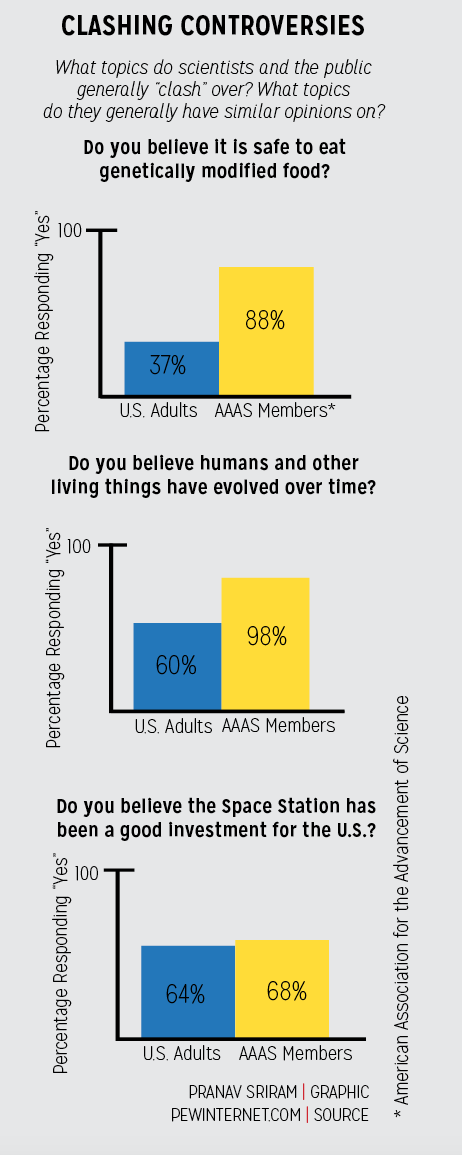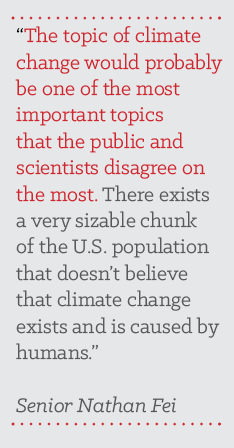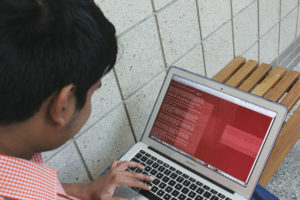Views on scientific topics conflict between scientists, public
September 16, 2016
A Pew Research study conducted in 2015 showed subjects where research is an important factor have caused controversy among scientists and others. With a difference in large opinion, scientists and the public each often think the other is not as informed. For instance, genetically-modified foods have caused a major dispute in the past. Science teacher Daniel Marble said he thinks the processes scientists use are much more complex than the public thinks.
“(Scientists’) whole understanding of the world is often based upon reason and the fact that you should only form opinions given reasonable information that informs those opinions. If you’re looking at genetically-modified food, if there’s evidence that would suggest that it’s harmful, scientists would be looking for that. There’s that investigation going on, but as far as I know, that hasn’t been found yet,” Marble said.
Science enthusiast and senior Nathan Fei said he agrees with Marble in that the public is generally less informed than scientists responsible for testing and conducting the research.
“People are not as well-informed on the topics of genetically-modified foods. Most people think of genetically-modified foods as ‘frankenfoods’ and become afraid. However, what they don’t realize is that genetically-modified foods go through rigorous testing, and that we already have many strains of genetically-modified crops feeding us today,” Fei said.
Student researcher and senior Abhinav Ramkumar said the public also considers ethics more so than scientists when performing various experiments. This results in disagreements regarding the common research practices.
He said, “Any type of research involving animal or human subjects results in controversy due to ethical and religious considerations of the public and those performing the experiments. As a result, current ethical practices put checks on what researchers can do and cannot do.”
However, the United States are advancing in scientific research in the form of STEM.































![AI in films like "The Brutalist" is convenient, but shouldn’t take priority [opinion]](https://hilite.org/wp-content/uploads/2025/02/catherine-cover-1200x471.jpg)













































![Review: “The Immortal Soul Salvage Yard:” A criminally underrated poetry collection [MUSE]](https://hilite.org/wp-content/uploads/2025/03/71cju6TvqmL._AC_UF10001000_QL80_.jpg)
![Review: "Dog Man" is Unapologetically Chaotic [MUSE]](https://hilite.org/wp-content/uploads/2025/03/dogman-1200x700.jpg)
![Review: "Ne Zha 2": The WeChat family reunion I didn’t know I needed [MUSE]](https://hilite.org/wp-content/uploads/2025/03/unnamed-4.png)
![Review in Print: Maripaz Villar brings a delightfully unique style to the world of WEBTOON [MUSE]](https://hilite.org/wp-content/uploads/2023/12/maripazcover-1200x960.jpg)
![Review: “The Sword of Kaigen” is a masterpiece [MUSE]](https://hilite.org/wp-content/uploads/2023/11/Screenshot-2023-11-26-201051.png)
![Review: Gateron Oil Kings, great linear switches, okay price [MUSE]](https://hilite.org/wp-content/uploads/2023/11/Screenshot-2023-11-26-200553.png)
![Review: “A Haunting in Venice” is a significant improvement from other Agatha Christie adaptations [MUSE]](https://hilite.org/wp-content/uploads/2023/11/e7ee2938a6d422669771bce6d8088521.jpg)
![Review: A Thanksgiving story from elementary school, still just as interesting [MUSE]](https://hilite.org/wp-content/uploads/2023/11/Screenshot-2023-11-26-195514-987x1200.png)
![Review: "When I Fly Towards You", cute, uplifting youth drama [MUSE]](https://hilite.org/wp-content/uploads/2023/09/When-I-Fly-Towards-You-Chinese-drama.png)
![Postcards from Muse: Hawaii Travel Diary [MUSE]](https://hilite.org/wp-content/uploads/2023/09/My-project-1-1200x1200.jpg)
![Review: "Ladybug & Cat Noir: The Movie," departure from original show [MUSE]](https://hilite.org/wp-content/uploads/2023/09/Ladybug__Cat_Noir_-_The_Movie_poster.jpg)
![Review in Print: "Hidden Love" is the cute, uplifting drama everyone needs [MUSE]](https://hilite.org/wp-content/uploads/2023/09/hiddenlovecover-e1693597208225-1030x1200.png)
![Review in Print: "Heartstopper" is the heartwarming queer romance we all need [MUSE]](https://hilite.org/wp-content/uploads/2023/08/museheartstoppercover-1200x654.png)

















